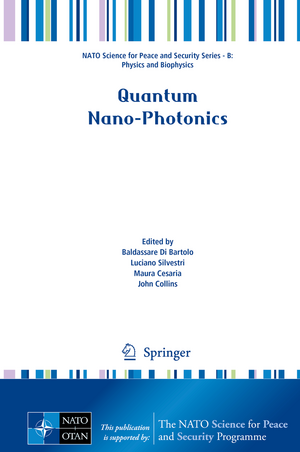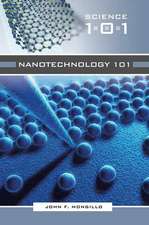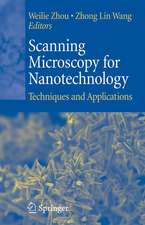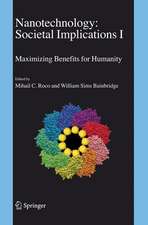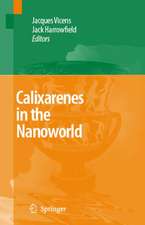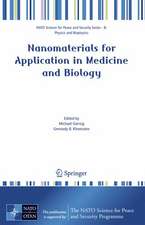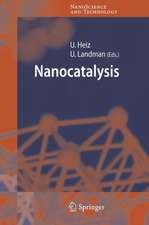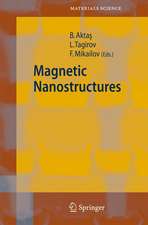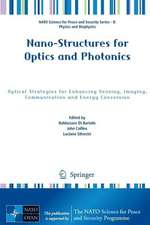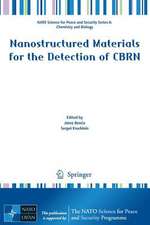Quantum Nano-Photonics: NATO Science for Peace and Security Series B: Physics and Biophysics
Editat de Baldassare Di Bartolo, Luciano Silvestri, Maura Cesaria, John Collinsen Limba Engleză Hardback – 20 sep 2018
| Toate formatele și edițiile | Preț | Express |
|---|---|---|
| Paperback (1) | 649.87 lei 6-8 săpt. | |
| SPRINGER NETHERLANDS – 25 sep 2018 | 649.87 lei 6-8 săpt. | |
| Hardback (1) | 593.80 lei 38-44 zile | |
| SPRINGER NETHERLANDS – 20 sep 2018 | 593.80 lei 38-44 zile |
Din seria NATO Science for Peace and Security Series B: Physics and Biophysics
- 18%
 Preț: 955.25 lei
Preț: 955.25 lei - 18%
 Preț: 1222.62 lei
Preț: 1222.62 lei - 24%
 Preț: 1057.17 lei
Preț: 1057.17 lei - 24%
 Preț: 788.31 lei
Preț: 788.31 lei - 18%
 Preț: 1223.74 lei
Preț: 1223.74 lei - 18%
 Preț: 1830.34 lei
Preț: 1830.34 lei - 15%
 Preț: 643.99 lei
Preț: 643.99 lei - 18%
 Preț: 1212.36 lei
Preț: 1212.36 lei - 18%
 Preț: 947.85 lei
Preț: 947.85 lei - 18%
 Preț: 950.52 lei
Preț: 950.52 lei - 20%
 Preț: 565.64 lei
Preț: 565.64 lei - 18%
 Preț: 950.66 lei
Preț: 950.66 lei - 24%
 Preț: 1060.06 lei
Preț: 1060.06 lei - 5%
 Preț: 1412.06 lei
Preț: 1412.06 lei - 18%
 Preț: 1226.90 lei
Preț: 1226.90 lei - 18%
 Preț: 945.79 lei
Preț: 945.79 lei - 18%
 Preț: 1221.20 lei
Preț: 1221.20 lei - 24%
 Preț: 789.61 lei
Preț: 789.61 lei - 18%
 Preț: 947.67 lei
Preț: 947.67 lei - 24%
 Preț: 1053.41 lei
Preț: 1053.41 lei - 18%
 Preț: 1834.77 lei
Preț: 1834.77 lei - 18%
 Preț: 943.08 lei
Preț: 943.08 lei - 15%
 Preț: 640.06 lei
Preț: 640.06 lei - 18%
 Preț: 945.30 lei
Preț: 945.30 lei - 18%
 Preț: 1217.62 lei
Preț: 1217.62 lei - 18%
 Preț: 951.14 lei
Preț: 951.14 lei - 18%
 Preț: 1216.02 lei
Preț: 1216.02 lei - 18%
 Preț: 1839.17 lei
Preț: 1839.17 lei - 15%
 Preț: 645.47 lei
Preț: 645.47 lei - 18%
 Preț: 1220.57 lei
Preț: 1220.57 lei - 18%
 Preț: 1217.90 lei
Preț: 1217.90 lei - 18%
 Preț: 1228.96 lei
Preț: 1228.96 lei - 18%
 Preț: 1232.71 lei
Preț: 1232.71 lei - 15%
 Preț: 652.17 lei
Preț: 652.17 lei - 18%
 Preț: 1220.88 lei
Preț: 1220.88 lei - 15%
 Preț: 639.73 lei
Preț: 639.73 lei - 18%
 Preț: 1224.36 lei
Preț: 1224.36 lei - 18%
 Preț: 1828.29 lei
Preț: 1828.29 lei
Preț: 593.80 lei
Preț vechi: 742.25 lei
-20% Nou
Puncte Express: 891
Preț estimativ în valută:
113.64€ • 118.20$ • 93.81£
113.64€ • 118.20$ • 93.81£
Carte tipărită la comandă
Livrare economică 08-14 aprilie
Preluare comenzi: 021 569.72.76
Specificații
ISBN-13: 9789402415438
ISBN-10: 9402415432
Pagini: 180
Ilustrații: XVI, 474 p. 149 illus., 126 illus. in color.
Dimensiuni: 155 x 235 mm
Greutate: 0.95 kg
Ediția:1st ed. 2018
Editura: SPRINGER NETHERLANDS
Colecția Springer
Seria NATO Science for Peace and Security Series B: Physics and Biophysics
Locul publicării:Dordrecht, Netherlands
ISBN-10: 9402415432
Pagini: 180
Ilustrații: XVI, 474 p. 149 illus., 126 illus. in color.
Dimensiuni: 155 x 235 mm
Greutate: 0.95 kg
Ediția:1st ed. 2018
Editura: SPRINGER NETHERLANDS
Colecția Springer
Seria NATO Science for Peace and Security Series B: Physics and Biophysics
Locul publicării:Dordrecht, Netherlands
Cuprins
Part 1: Lectures.- 1.Sergey. Gaponenko – Nano-Photonics with and without Photons.- 2.Lukas Novotny – Quantum Sensing and Engineering.- 3.Maura Cesaria and Baldassare Di Bartolo – Nanophosphoros: from rare earth activated multicolo-tuning to new efficient white light sources.- 4.John Collins - Non-Radiative Processes In Crystals and Nanocrystals.- 5.Jean-Pierr Wolf – Quantum Aspects of Biophotonics.- 6. Lora Ramunno – Simulations in Nano-Photonics.- 7.John Bowen - Terahertz Nanoscale Science and Technology.- 8.Fabrizio Pinto – Casimir Forces: Fundamental Theory, Computation, and Nano-device Applications.- 9. Diana Adliene – Nano-materials and Nano-technologies for Photon Radiation Enhanced Cancer Treatment.- 10.Oliver Benson – Fundamental Experiments and Quantum Technology Applications with Defect Centres in Diamond.- 11.Hilmi Volkan Demir - Emerging Fields of Colloidal Nanophotonics for Quality Lighting to Versatile Lasing.- 12.Joshua Caldwell - Semiconductor Nano-Photonics usingSurface Polaritons.- 13.Wolfram Pernice - Waveguide integrated superconducting single photon detectors.- 14.Stephen Arnold – Whispering Gallery Mode resonators as opto-mechanical probes to nano-particle-microscavity interactios and charge.- 15.Markus Pollnau – Novel Aspects of Fabry-Perot Resonator.- 16.Rolindes Balda - Performance of Nd3+ as structural probe of rare-earth distribution in transparent nanostructured glass-ceramics.- 17.Malrgorzata Guzik - Research on the Yb 3+ ion activated cubic molybdates and molybdato-tungstates for optical transparent ceramics.- Part II: Short Seminars.- 1. Fabian Beutel – Quantum Key Distribution over Free Space.- 2.Antonino Cala’ Lesina – Modelling of Coloured Metal Surfaces by Plasmonics Nanoparticles.- 3.Onur Erdem - Exciton Dynamics of Colloidal Semiconductor Quantum Well Stacks.- 4.James Godfrey - InAsP Quantum Dots in InP Nanowire Waveguides as Sources of Quantum Light.- 5. Wladislaw Hartmann - Diamond Nano-Photonic Circuits.- 6.Isabelle Palstra - Superchiral Near Fields in Photonic Crystal Waveguides.- 7.Marya Rudenko - Neodymium doped Luminescent Composites Derived From the Sols Based On Carboxylic Acids.- 8.Konstantin Shportko - Vibrational properties of Ge-Sb-Te phase-change alloys studied by temperature-dependent IR and Raman spectroscopy.- 9.Felix Stete - Size dependence of the coupling strength in plasmon-exciton Nano-Particles.- 10.Hasan Tabanli - Introduction to Shock Wave-Boundary Layer Interaction and Unstart in Supersonic Inlets.- 11.Sevcan Tabanli - Investigation of the white light emission from Er/Nd/Yb rare earth oxides at vacuum and atmospheric pressure.- 12.Nicolai Walter - Carbon Nanotubes as integrated electrically driven Light Source.- Part III: Posters.- 1.Antonino Cala’ Lesina – Plasmonic Metasurfaces for Nonlinear Structured Light1) Antonino Cala’ Lesina – Plasmonic Metasurfaces for Nonlinear Structured Light.- 2.Gabriel Campargue – Cell Poration of Fixed and Live Cells by Phase Shaped femtosecond pulses.- 3.Marco Clementi – On-chip nonlinear optics in silicon rich nitride photonic crystal cavities.- 4.Tobias Frenzel - Mechanical Activity: The elastic counterpart of optical activity.- 5.Wladislaw Hartmann - Highly compact and scalable waveguide-integrated single photon spectrometer based on tailored disorder.- 6.Iyer – Symmetry Breaking and Active Fano resonance Tuning in Dolmen Nano-structures.- 7.Robert Keitel - Pump-Profile Engineering for Spatial- and Spectral-Mode Control in Two-Dimensional Colloidal-Quantum-Dot Spasers.- 8.Caroline Klusmann - Hybridizing whispering gallery modes and plasmonic resonances in a photonic meta-device for bio-sensing applications.- 9.Julian Koepfler - Three-dimensional Chiral Photonic Crystals in the Thz Regime Exhibiting Weyl Points with Topological Charges.- 10.Frederik Mayer - Three-dimensional Fluorescent Security Features Fabricated via 3D Laser Lithography.- 11.Michael Meeker - Strong coupling effects between IR-inactive zone folded LO phonon and localized surface phonon polariton modes in SiC nanopillars.- 12.Tobias Messer - Measuring the intensity profile of arbitrary shaped laser foci using confocal microscopy.- 13.Alexander Munchinger – 3D Cubic buclking mechanical metamaterials.- 14.Stefano Orlando – Light absorbing diamond for solar energy conversion.- 15.Nikolai Passler - Nonlinear Response and Strong Coupling of Surface Phonon Polaritons.- 16.Marco Passoni - Grating couplers in Silicon-on-insulator: the role of photonic guided resonances on lineshape and bandwith.- 17.Siim Pikker - Aluminum plasmonics: fabrication and characterization of broadly tunable plasmonic surfaces for plasmon molecule strong-coupling and fluorescence enhancement.- 18.Jinq Yuan Qu - 3D Metamaterials with Negative Thermal Expansion and Negative Effective Compressibility.- 19.Andrei Ramanenka - Colloidal Spherical Silver Nanoparticles Based Plasmon Enhanced Fluorescence for Rapid Quantitative Point of Care Testing Fluorescent Immunoassay Development.- 20.Maryia Rudenko - Synthesis And Photoluminescence Of Strontium Titanate Xerogels Doped With Terbium, Ytterbium And Europium.- 21.Philip Schrinner - Integration of single photon sources with nano-photonic circuits.- 22.Konstantin Shportko - Vibrational properties of Ge-Sb-Te phase-change alloys studied by IR and Raman spectroscopy at different temperatures.- 23.Vladislav Stefanov - Quantum state engineering with single atom laser.- 24.Felix Stete - Signatures of Strong Coupling on Nanoparticles: Revealing Absorption Anticrossing by Tuning the Dielectric Environment.- 25.Sevcan Tabanli – Solid State Synthesis, structural and Up-Conversion Properties of Yb3+/Er3+ and Yb3+/Tm3+/Er3+ doped La2Ti2O7 Phosphors.- 26.Silvia Tofani- Static and tunable devices for terahertz focusing and beam steering.- 7.List of Participants.
Recenzii
“The book will be useful to graduate students entering the field of quantum nanophotonics, as well as to those already working there but wanting to deepen their understanding or broaden their interests.” (Mark Fox, Optics & Photonics News, osa-opn.org, April 18, 2019)
Notă biografică
BALDASSARE DI BARTOLO Baldassare (friendly called Rino by friends) teaches physics at Boston College. He got his first degree in Industrial Engineering at the University of Palermo and followed his studies in Telecommunications and Radar Technique in Rome at the Superior Institute of Telecommunications and National Research Council, respectively.
After an insdustrial experience in Italy he moved to the United States where he gained a Ph.D. in Physics at the Massachusetts Institute of Technology.
An industrail experience in USA in the of laser physics was a prelude to his joining Boston College where he has been teaching since 1968. He has written or edited some 36 books and published 170 articles. He has written two books of short stories in Italian.
He has been the director of the International Atomic and Molecular Spectroscopy of the Ettore Majorana center in Erice Sicily, Italy since 1974
LUCIANO SILVESTRI
Luciano Silvestri received his Bachelor degree summa cum laudae from University of Massachusetts Boston in 2011 with a thesis in the thermalization of open quantum systems. In addition, as an undergrad he worked on the manufacturing and characterization of nano-electromechanical systems at Northeastern University.
Since 2011 he has been the Scientific Secretary of the International School of Atomic and Molecular Spectroscopy in Erice. He has been part of the organizing committee of the last four NATO ASI on Nano-Optics and Nano-Photonics, and three Workshops on Luminescence.
He is currently completing his Doctoral degree in theoretical physics at Boston College. His research interests have shifted to strongly coupled plasmas and nuclear fusion.
MAURA CESARIA
Cesaria Maura graduated in Physics cum laude in 2008 at the University of Salento (Lecce, Italy) and received her Ph.D. degree in Physics in 2012 at the University of Salento (Lecce, Italy) with a thesis dealing with the experimental and theoretical characterization of very thin Cr-doped ITO films deposited by pulsed laser ablation for spintronic applications. Since then she has worked as a research fellow in Italy in the fields of material science and nanophotonics.Her research activity at the Physics Department of the University of Salento have focused on laser-based deposition techniques (i.e., nano- and femto-second PLD, MAPLE) for depositing inorganic bulk materials and nanostructures as well as monolayer and multilayer of emitting polymers. In this framework her studies contributed to the understanding of the origin of itinerant ferromagnetism in Cr-doped ITO films as related to Cr-oxygen vacancy complexes, the development ex-novo of a theoretical algorithm and experimental spectrophotometric procedure for calculating a realistic absorption coefficient of (ultra)thin films covering transparent substrates that first and only one includes the non measurable contribution from the film-substrate interface, and the realization of the first white light emitting diode made by multi-layer polymeric thin films. More recently, her activity as a fixed-term researcher at the IMM-CNR Institute (unit of Lecce-Italy) has focused on PDMS-based microfluidics and colloidal lithography techniques for sensing applications using plasmonic nanoparticles and short-range ordered nanohole arrays .
Since 2013 she contributes to the organization of the Spectroscopy School held at the Majorana Foundation (Erice, Italy) and collaborates with Prof. Di Bartolo (Boston College (MA, USA)) in spectroscopy studies of white-light emitting nanophosphors.
JOHN COLLINS
John Collins is a Professor of Physics at Wheaton College in Norton, MA USA. His research areas of interest involve the interaction of radiation with matter. He is an experimental physicist trained in the field of luminescence spectroscopy of solids doped with transition metal and rare earth ions. Specific areas of interest include energy transfer, nonradiative processes, luminescence in nanosystems, and plasmonic effects on radiative and non-radiative processes of excited ions in solids. Dr. Collins has co-edited several books and journal volumes on topics such as spectroscopy of solids, nano-optics, biophotonics, and visible and infrared phosphors, and has authored or co-authored numerous articles and book chapters. He has served as Chair of the Luminescence and Display Materials Division of the Electrochemical Society and currently serves on its Executive Committee, and also serves on the Organizing Committee of the International School of Atomic and Molecular Spectroscopy.
After an insdustrial experience in Italy he moved to the United States where he gained a Ph.D. in Physics at the Massachusetts Institute of Technology.
An industrail experience in USA in the of laser physics was a prelude to his joining Boston College where he has been teaching since 1968. He has written or edited some 36 books and published 170 articles. He has written two books of short stories in Italian.
He has been the director of the International Atomic and Molecular Spectroscopy of the Ettore Majorana center in Erice Sicily, Italy since 1974
LUCIANO SILVESTRI
Luciano Silvestri received his Bachelor degree summa cum laudae from University of Massachusetts Boston in 2011 with a thesis in the thermalization of open quantum systems. In addition, as an undergrad he worked on the manufacturing and characterization of nano-electromechanical systems at Northeastern University.
Since 2011 he has been the Scientific Secretary of the International School of Atomic and Molecular Spectroscopy in Erice. He has been part of the organizing committee of the last four NATO ASI on Nano-Optics and Nano-Photonics, and three Workshops on Luminescence.
He is currently completing his Doctoral degree in theoretical physics at Boston College. His research interests have shifted to strongly coupled plasmas and nuclear fusion.
MAURA CESARIA
Cesaria Maura graduated in Physics cum laude in 2008 at the University of Salento (Lecce, Italy) and received her Ph.D. degree in Physics in 2012 at the University of Salento (Lecce, Italy) with a thesis dealing with the experimental and theoretical characterization of very thin Cr-doped ITO films deposited by pulsed laser ablation for spintronic applications. Since then she has worked as a research fellow in Italy in the fields of material science and nanophotonics.Her research activity at the Physics Department of the University of Salento have focused on laser-based deposition techniques (i.e., nano- and femto-second PLD, MAPLE) for depositing inorganic bulk materials and nanostructures as well as monolayer and multilayer of emitting polymers. In this framework her studies contributed to the understanding of the origin of itinerant ferromagnetism in Cr-doped ITO films as related to Cr-oxygen vacancy complexes, the development ex-novo of a theoretical algorithm and experimental spectrophotometric procedure for calculating a realistic absorption coefficient of (ultra)thin films covering transparent substrates that first and only one includes the non measurable contribution from the film-substrate interface, and the realization of the first white light emitting diode made by multi-layer polymeric thin films. More recently, her activity as a fixed-term researcher at the IMM-CNR Institute (unit of Lecce-Italy) has focused on PDMS-based microfluidics and colloidal lithography techniques for sensing applications using plasmonic nanoparticles and short-range ordered nanohole arrays .
Since 2013 she contributes to the organization of the Spectroscopy School held at the Majorana Foundation (Erice, Italy) and collaborates with Prof. Di Bartolo (Boston College (MA, USA)) in spectroscopy studies of white-light emitting nanophosphors.
JOHN COLLINS
John Collins is a Professor of Physics at Wheaton College in Norton, MA USA. His research areas of interest involve the interaction of radiation with matter. He is an experimental physicist trained in the field of luminescence spectroscopy of solids doped with transition metal and rare earth ions. Specific areas of interest include energy transfer, nonradiative processes, luminescence in nanosystems, and plasmonic effects on radiative and non-radiative processes of excited ions in solids. Dr. Collins has co-edited several books and journal volumes on topics such as spectroscopy of solids, nano-optics, biophotonics, and visible and infrared phosphors, and has authored or co-authored numerous articles and book chapters. He has served as Chair of the Luminescence and Display Materials Division of the Electrochemical Society and currently serves on its Executive Committee, and also serves on the Organizing Committee of the International School of Atomic and Molecular Spectroscopy.
Textul de pe ultima copertă
This book brings together more closely researchers working in the two fields of quantum optics and nano-optics and provides a general overview of the main topics of interest in applied and fundamental research. The contributions cover, for example, single-photon emitters and emitters of entangled photon pairs based on epitaxially grown semiconductor quantum dots, nitrogen vacancy centers in diamond as single-photon emitters, coupled quantum bits based on trapped ions, integrated waveguide superconducting nanowire single-photon detectors, quantum nano-plasmonics, nanosensing, quantum aspects of biophotonics and quantum metamaterials. The articles span the bridge from pedagogical introductions on the fundamental principles to the current state-of-the-art, and are authored by pioneers and leaders in the field. Numerical simulations are presented as a powerful tool to gain insight into the physical behavior of nanophotonic systems and provide a critical complement to experimental investigations and design of devices.
Caracteristici
Introduces students to the field of nanophotonics Provides a comprehensive overview on experiments and theory, basic physics and applications as well as on nanofabrication and optical characterization Starts from the consideration of fundamental principles, and reaches the frontiers of research in a systematic and didactic fashion
